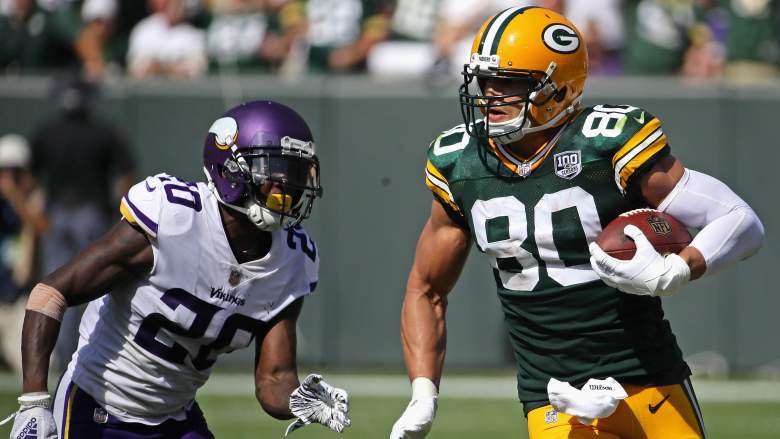
Getty The Vikings and the Packers tied in their Week 2 matchup.
The 2018 NFL season has started with a number of close games, leaving many fans to wonder about the overtime rules. There were two tie games in the first two weeks of play.
The NFL overtime rules are fairly straightforward. A coin toss determines who gets to select whether to kick or receive. The majority of teams choose to receive. If the team that has the ball first scores a touchdown, the game is over. A field goal means the opponent gets a chance to have the ball. The NFL changed the format from sudden-death in 2012. The overtime period is given a 10 minute clock, but if one of the teams wins the game the entire clock is not used. Here is how the NFL outlines the overtime rules.
At the end of regulation, the referee will toss a coin to determine which team will possess the ball first in overtime. The visiting team captain will call the toss. No more than one 10-minute period will follow a three-minute intermission. Each team must possess, or have the opportunity to possess, the ball. The exception: if the team that gets the ball first scores a touchdown on the opening possession. Sudden death play — where the game ends on any score (safety, field goal or touchdown) — continues until a winner is determined. Each team gets two timeouts. The point after try is not attempted if the game ends on a touchdown. If the score is still tied at the end of the overtime period, the result of the game will be recorded as a tie. There are no instant replay coach’s challenges; all reviews will be initiated by the replay official.
NFL Games Can End in a Tie During the Regular Season
If the game is tied at the end of the overtime period, the game is declared a tie. Each team gets a tie recorded in the win-loss-tie standings. For example, if a team has won two games, lost one game and has one tie their record would be 2-1-1. Games cannot end in a tie during the NFL playoffs. Here is how the league outlines the NFL overtime rules for postseason play.
If the score is still tied at the end of an overtime period — or if the second team’s initial possession has not ended — the teams will play another overtime period. Play will continue regardless of how many overtime periods are needed for a winner to be determined. There will be a two-minute intermission between each overtime period. There will not be a halftime intermission after the second period. Another coin toss will be held before the third overtime period. The captain who lost the first overtime coin toss will either choose to possess the ball or select which goal his team will defend, unless the team that won the coin toss deferred that choice.
According to an SB Nation survey, fans would prefer the NFL go to college football overtime rules where there are no ties. The survey found 47 percent of fans want the NFL to change to college football overtime rules, 31 percent want to keep it as it is and 21 percent of people prefer the old sudden death system.
